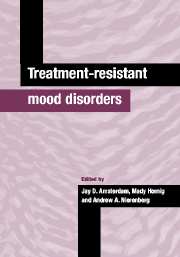Book contents
- Frontmatter
- Contents
- List of contributors
- Preface
- Part I The clinical problem
- Part II Biological basis
- 3 Psychoneuroendocrine aspects of treatment-resistant mood disorders
- 4 Estrogen and depressive illness in women
- 5 Sleep abnormalities in treatment-resistant mood disorders
- 6 Structural and functional brain imaging in treatment-resistant depression
- 7 Immunologic factors in treatment-resistant depression
- Part III Treatment approaches
- Part IV Special patient populations
- Part V Economic and ethical issues
- Index
- Plate Section
7 - Immunologic factors in treatment-resistant depression
from Part II - Biological basis
Published online by Cambridge University Press: 25 March 2010
- Frontmatter
- Contents
- List of contributors
- Preface
- Part I The clinical problem
- Part II Biological basis
- 3 Psychoneuroendocrine aspects of treatment-resistant mood disorders
- 4 Estrogen and depressive illness in women
- 5 Sleep abnormalities in treatment-resistant mood disorders
- 6 Structural and functional brain imaging in treatment-resistant depression
- 7 Immunologic factors in treatment-resistant depression
- Part III Treatment approaches
- Part IV Special patient populations
- Part V Economic and ethical issues
- Index
- Plate Section
Summary
Introduction
Nearly 30% of depressed patients fail to achieve an adequate response to psychopharmacological treatment and at least 60% fail to achieve complete remission from their major depressive episode (MDE). Thus, the majority of depressed patients suffer from some degree of treatment-resistant depression (TRD) (Fawcett, 1994; O'Reardon & Amsterdam, 1999). Despite advances in psychopharmacological treatment, the mortality and morbidity of this disorder make depression a major public health problem in most countries.
The biological basis of TRD is still unclear. However, several lines of research have suggested the possibility of alterations in central stress-induced neuroendocrine and immunoendocrine compensatory mechanisms. These appear to result in a variety of hormonal and immunologic ‘markers’ in TRD. The study of these indices may enhance our understanding of why some patients do not respond to apparently adequate antidepressant treatment, and may help identify which therapies might be successful for particular patients. Both clinical and experimental studies indicate that the susceptibility to MDE reflects an interplay between environmental and genetic factors.
The immune system may be viewed as a sensory organ that recognizes physical and emotional stress, and relays this information to the central nervous system (CNS) and endocrine system via immunoendocrine protein messengers or cytokines. There is compelling experimental evidence of an intimate interaction between the CNS, endocrine and immune system, and putative links between these systems have been recognized. The dysregulations in the central stress response in patients with MDE could potentially reflect a generalized stress adaptation response that has escaped its normal counter-regulatory restraint mechanisms (Chrousos & Gold, 1992).
Keywords
- Type
- Chapter
- Information
- Treatment-Resistant Mood Disorders , pp. 142 - 156Publisher: Cambridge University PressPrint publication year: 2001



